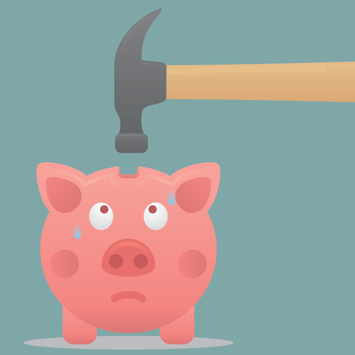 Everyone has bad habits, some of which we may not even been aware. It’s no different when it comes to your finances. There are small, everyday decisions you could be making that are hurting you. Check out some of the more common money habits and ways to combat them.
Everyone has bad habits, some of which we may not even been aware. It’s no different when it comes to your finances. There are small, everyday decisions you could be making that are hurting you. Check out some of the more common money habits and ways to combat them.
NOT TRACKING SPENDING
It’s easy to make simple purchases here and there that can start to add up over time. Hold yourself accountable to how you spend your money. Even if it seems like an insignificant purchase, like a pack of gum, write it down. Spending even just a few extra dollars a week can account into hundreds of dollars a year.
GOING OUT TOO MUCH
Do you find yourself stopping on the way to work for a coffee, then going out to grab lunch with co-workers later in the day, and finally picking up a pizza for dinner on the way home? You’re not alone. It was estimated in 2019, that a person in Utah will spend about $2,206 a year on dining out. This doesn’t mean you have to stop going out entirely, just use discretion and make small cuts. Say you go out to lunch every day and are spending anywhere from $7 to $10 per meal. Bringing lunch just twice a week can save you between $728 to $1040 a year.
THROWING AWAY FOOD
Take the time each week to plan meals so you don't end up throwing expired groceries away and wasting money. According to Business Insider, over 100 billion pounds of food is thrown away each year. Also, take the time to look at coupons so you can save even more money.
NOT SAVING FOR RETIREMENT
We get it. For some of us, this may be 30+ years in the future. It’s hard to visualize that far in advance when there are things that you want right now. However, not planning for the future is one of the worst habits you can make when it comes to financial planning. Set up direct contributions with your employer and see if they have a 401(k) match program available.
PAYING DOUBLE
Do you find yourself paying for both multiple streaming services and cable? Some of these features tend to cross over, like Netflix and OnDemand Movies. For the time being, figure out what is most important to you and cut everything else. Going a year without cable can make a world of difference to your savings. Don't forget about utilizing other options like the library, which offers free rentals on some your favorite DVDs, or spending time with family to catch the big game.
NOT AUTOMATICALLY SAVING
With every paycheck you receive, you should be paying yourself first. If you don't already, set up an automatic savings plan. This will ensure that some of your hard earned money will be tucked safely away before you start paying bills and spending money.



